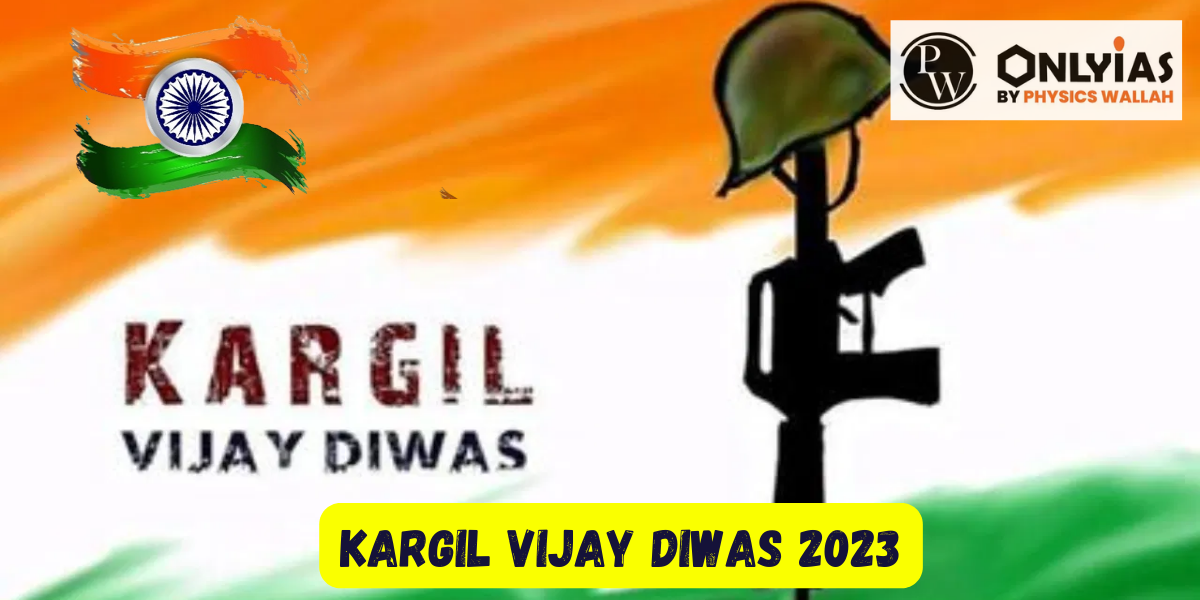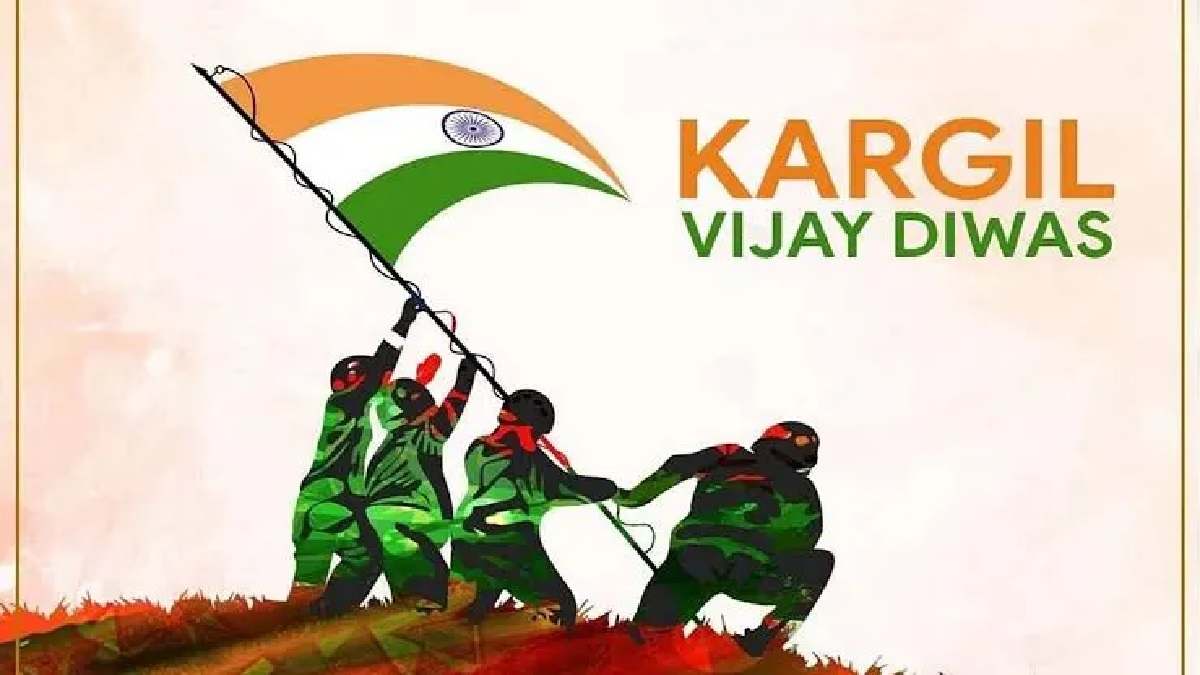Every year on July 26th, India commemorates Kargil Vijay Diwas, a day dedicated to honoring the courage and sacrifice of Indian soldiers who bravely fought and laid down their lives during the Kargil War in 1999.

Kargil Vijay Diwas 2023: Every year on July 26th, India commemorates Kargil Vijay Diwas, a day dedicated to honoring the courage and sacrifice of Indian soldiers who bravely fought and laid down their lives during the Kargil War in 1999. This significant military victory, known as Operation Vijay, marked the successful defense against Pakistani forces that had intruded into Indian territory across the Line of Control (LoC) in the Kargil district of Jammu and Kashmir. This year, India is celebrating the 24th anniversary of Kargil Vijay Diwas, also referred to as the Kargil War or Kargil Conflict, during which the Indian Army reclaimed strategic posts, including the renowned ‘Tiger Hill,’ from the Pakistani troops.

Kargil Vijay Diwas is observed nationwide, with the Prime Minister of India participating in a yearly tribute to the martyrs at Amar Jawan Jyoti near India Gate. Additionally, a Kargil War memorial is situated in Dras, at the foothills of Tololing Hill, constructed by the Indian Army to commemorate the soldiers who made the ultimate sacrifice during the war. Notably, the entrance of the memorial bears an inscription of a poem titled ‘Pushp Kii Abhilasha,’ and the Memorial Wall proudly displays the names of the brave martyrs.
Kargil Vijay Diwas holds significant importance in the history of India and serves as a tribute to the bravery and sacrifices of the Indian armed forces. Here are some key reasons why this day is considered crucial:
In the pages of history, India managed to successfully drive out Pakistani troops from its territory, marking the end of the war on July 26. This significant day is now commemorated as Kargil Vijay Diwas. During the conflict, 527 soldiers made the ultimate sacrifice for their country.
The Kargil War, which took place between May and July 1999 in the Kargil district of Jammu and Kashmir along the Line of Control (LoC), concluded with India emerging victorious. Lasting over 60 days, the war ended on July 26 when India reclaimed control.
On this date in 1999, the Pakistan army capitalized on the melting snow and violated the bilateral understanding between the two nations. They took advantage of the unguarded posts during the winter season and seized control of high outposts in India.
Despite Pakistan’s denial of its soldiers’ involvement, evidence such as ammunition, identity cards, and ration stores, clearly point to the Pakistan army’s responsibility for this cowardly act. They claimed that the rebels from Kashmir were responsible, but the evidence strongly suggests otherwise.

The Kargil War was a conflict between India and Pakistan that took place between May and July 1999 in the Kargil district of Indian-administered Jammu and Kashmir. It was a limited, high-altitude conflict and is also referred to as the Kargil conflict or the Kargil intrusion.
The Kashmir region has been a longstanding point of contention between India and Pakistan since their independence in 1947. Both countries claimed sovereignty over the entire region, leading to several wars and skirmishes, including the 1947-1948, 1965, and 1971 wars.
In early 1999, Pakistani forces, under the guise of mujahideen (freedom fighters), infiltrated across the Line of Control (LOC), the de facto border that divides the Kashmir region between India and Pakistan. The Pakistani Army’s goal was to occupy strategic heights and positions in the Kargil sector, which would enable them to control the vital highway connecting Srinagar (the summer capital of Jammu and Kashmir) to Leh (the capital of the Ladakh region).
The Kargil War began in May 1999 when the Indian Army discovered the infiltration of Pakistani troops and militants in the Kargil sector. The infiltrators had taken positions on high ridges and mountain peaks, giving them a significant advantage in the rugged terrain.
The Indian forces launched a military operation to push back the intruders and regain control of the occupied territories. The conflict escalated quickly, with intense fighting in the harsh mountainous environment. Indian troops faced several challenges, including the difficulty of accessing the high-altitude locations, harsh weather conditions, and constant shelling from the Pakistani side.
Despite these challenges, the Indian Army gradually gained ground, and with determination and valor, they recaptured most of the strategic peaks by early July 1999. The recapture of the peaks was a turning point in the war, and Pakistan faced increasing international pressure to withdraw its forces.
As the conflict escalated, international diplomatic efforts were made to bring an end to the hostilities. The United States and other major powers intervened, urging Pakistan to withdraw its forces from the occupied territory. Pakistani Prime Minister Nawaz Sharif met with U.S. President Bill Clinton in Washington, D.C., and agreed to pull back Pakistani troops to their side of the LOC.
On July 26, 1999, the Indian Army announced that it had successfully evicted the last of the Pakistani intruders from the Kargil sector, effectively ending the war.
The Kargil War had significant consequences for both India and Pakistan. The conflict exposed the risks of limited wars between the two nuclear-armed nations and the dangers of nuclear escalation. It also highlighted the importance of diplomacy and international pressure in resolving disputes between the two countries.
In India, the war was seen as a victory, bolstering national pride and appreciation for the armed forces. On the other hand, Pakistan faced international criticism for initiating the conflict and suffered reputational damage.
The Kargil War further complicated the Kashmir issue, making the prospects of a peaceful resolution even more challenging. The conflict also led to increased tensions between India and Pakistan in the years that followed.

Kargil Vijay Diwas is observed on July 26th each year to commemorate the victory of the Indian Armed Forces over Pakistani infiltrators during the Kargil conflict in 1999. This day is a tribute to the valor and sacrifice of the Indian soldiers who fought bravely to safeguard the nation’s integrity. Here are some quotes to honor their courage and dedication:
“Cowards die many times before their deaths; the valiant never taste of death but once.” – William Shakespeare
Yes Today is Kargil Vijay Diwas 2023. Every year, on July 26, the country unites in commemoration of Kargil Vijay Diwas, a momentous occasion that pays tribute to the victory of the Indian armed forces in the Kargil War fought against Pakistan.
हाँ आज कारगिल विजय दिवस 2023 है। हर साल, 26 जुलाई को, देश कारगिल विजय दिवस मनाने के लिए एकजुट होता है, यह एक महत्वपूर्ण अवसर है जो पाकिस्तान के खिलाफ लड़े गए कारगिल युद्ध में भारतीय सशस्त्र बलों की जीत को श्रद्धांजलि देता है।
The Kargil War ended on July 26, 1999, when the Indian Army successfully recaptured the high outposts in the Kargil sector of Jammu and Kashmir, which had been occupied by Pakistani forces. This conflict lasted for approximately two months, from May 3, 1999, to July 26, 1999. The war resulted in a victory for India and led to the restoration of the status quo ante bellum, with Pakistan's forces withdrawing from the Indian territory they had occupied during the conflict.
Vijay Diwas is observed annually on December 16th to commemorate the triumph of the Indian armed forces against Pakistan during the 1971 conflict. It is a day when India pays its respects to the courageous soldiers who valiantly safeguarded the nation during that war.
<div class="new-fform">
</div>
